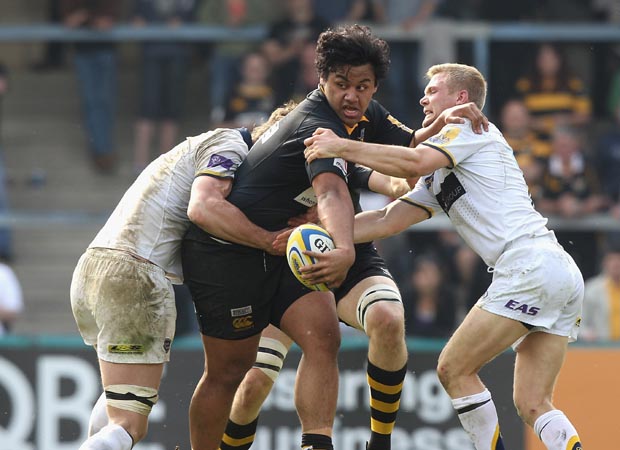 Here we go again, as soon as there is the slightest potential to extract some money from the RFU, the Premiership simply cannot resist. In seeking to stage the World Cup, the RFU have, in the opinion of the Premiership, overstepped their authority and should have consulted them first.
Here we go again, as soon as there is the slightest potential to extract some money from the RFU, the Premiership simply cannot resist. In seeking to stage the World Cup, the RFU have, in the opinion of the Premiership, overstepped their authority and should have consulted them first.
If ever there was a case of the tail attempting to wag the dog this must be it, even though I accept there would be an impact, negative and positive on the Premiership.
Under the RWC agreement there should be no elite rugby played in the host country during the cup, which means a late October start to the 2015 season, giving the Premiership players an extra long summer break next year.
The clubs say that this late start will cost them around £1.2 million each and should therefore be compensated to the tune of £14 million on top of the already substantial funding package they receive from the Union.
I must admit I am not convinced on the figures from the Premiership given that there is such a disparity amongst the clubs on size of gate at each club.
Whilst a select few like Leicester and Northampton can boast of large sell-out home crowds, some clubs like Newcastle and London Welsh will be reliant on away fans to make up numbers.
It is possible that not playing could actually be beneficial for the clubs and players, as a longer break should help players to be fully rested and prepared for when the season starts and could possibility help the English clubs in the new Champions Cup and could save the clubs match fees and potential win bonus costs.
The clubs should be jumping for joy that the RFU bid for the World Cup. For despite the late start to their season, in all probability if England have a successful tournament the game as a whole will get a big boost in participant and spectator numbers, thereby potentially increasing their gates and earnings even in a shortened season.
The clubs have tacitly admitted that is what they expect as a number of the premier elite have announced plans to increase seating capacity in time for the 2015 season.
The threats to play unless they are offered something substantially higher than £6 million already on the table, potentially damages the game at a time when every effort should be made to show the game is a positive light for the benefit of the game as a whole, not just the professional few.
All business is about taking calculated risks so the Premiership should see the delayed start to their season as an opportunity to increase revenues in the long term helped by the high profile the sport will get holding the World Cup in England at the RFU expense.
*More worrying than the clubs' posturing is the imminent release of health expert Allyson Pollock's book Tackling Rugby: What Every Parent Should Know.
In the book she outlines the risk of serious injury to young rugby players in the school game and says that there is the risk of serious injury to an average of one in six players per season while in some schools the risk is as high as one in three.
She is backed by Pooler Archbold (a consultant orthopaedic and trauma surgeon) who believes the injuries are a direct result of the increasing size of young players and speculates that it could be 16-year-olds being injured by 18-year-olds.
There has always been an age/size discrepancy in over-16's schools rugby because, at that stage, three school years are combined into one team.
Add to that the September start of the school year and the age difference can be almost an entire year between players in the same team in any school year.
I played in the same team as my elder brother who was two school years above me, despite being just 18 months older.
As a result, the size of the different ages could be quite dramatic and impact considerably on games, we can all remember our school days when the opposition had big lads that ran through the whole of your team and the fear of facing them again the following season wondering how much bigger would they be?
Normally things would balance themselves out over time and sometimes the big lads at 16 weren't quite so big the following year as we had all grown and they hadn't – but now it's different.
Since the dawn of professionalism and the option of a career in rugby, all young players that want to follow that path must make the grade at U16 schools county rugby to be assigned to an academy and the only chance of a potential professional contract.
It is likely that the schools with the higher injury potential are those that play against the schools that have a history of providing players for the counties.
A number of schools offer bursaries for the best young players and have links with the academies to help ensure a smooth transition once selected.
They also have specialised training programmes to help prepare the players and that would include a weights program, something that most other 15-year-olds would not be subjected to, in fact it is generally discouraged at such a young age unless under strict supervision, in case of consequential damage.
Another possibility is the intensive training programmes given to young academy players could make them a danger to other players who have not had the same level of training and the same is true in the senior game.
Ms Pollock's answer is to do away with scrums and tackling in the youth game – but that would actually increase the risk of serious injury in the adult game for those that had never experienced scrums or tackles.
A simpler answer would be to use the New Zealand system that categorises youth players by weight (something necessary because of the number of Islanders) or, once signed to an academy, a player is no longer allowed to play for his school, in effect taking away the risks to others without the same level of experience.
*This article was first published in The Rugby Paper on August 31.


























